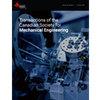鳍片与管组件接触质量改进研究
IF 1
4区 工程技术
Q4 ENGINEERING, MECHANICAL
Transactions of The Canadian Society for Mechanical Engineering
Pub Date : 2023-12-12
DOI:10.1139/tcsme-2023-0062
引用次数: 0
摘要
翅片对管组件是热交换器中一种普遍的连接方式,尤其是在小型设备中。在装配过程中,模具会膨胀管子,以缩小管子与鳍片套环之间的间隙,从而提高传热效果。模具膨胀缩小了间隙,并产生轻微的干涉,使翅片套圈能够紧贴管子。然而,最近的研究表明,在配合表面的整个宽度上,接触并不是均匀连续的。由于接触质量不理想,热量的传导受到严重影响,热交换器的效率也因此大打折扣。本研究旨在确定翅片孔轮廓形状与接触质量之间的关系,为提高管翅接触提供指导。研究对象包括各种材料的管材、不同尺寸的模具以及具有沙漏形状轴环的翅片。通过在不同的有限元模型上进行一系列膨胀模拟,对鳍孔沙漏形状的影响进行评估。随后,膨胀过程中在管与翅片接口处形成的微间隙将用于评估接触面的质量,并将实施热瞬态分析以证实研究结果。本文章由计算机程序翻译,如有差异,请以英文原文为准。
A Study on the Contact Quality Improvement of Fin to Tube Assemblies
The fin-to-tube assembly is a prevalent connection type in heat exchangers, particularly in smaller equipment. During the assembly process, a die expands the tube to close the gap between the tube and the fin collar, enhancing heat transfer. The die expansion reduces the gap and creates slight interference that enables the fin collar to adhere to the tube. However, contact is not uniformly continuous across the width of the mating surfaces, as indicated by recent research. Due to this suboptimal contact quality, the conduction of heat is significantly impaired, and the efficiency of the heat exchanger is thus compromised. This study aims to establish a relationship between the profile shape of the fin hole and the contact quality, offering guidelines to enhance tube-to-fin contact. Tubes of various materials, dies of different sizes, and fins with a collar featuring an hourglass proposed shape are examined. The influence of a fin-hole hourglass shape will be assessed through a series of expansion simulations conducted on diverse finite element models. Subsequently, the micro-gaps formed during the expansion process at the tube-to-fin interface will serve to evaluate the quality of the contact surface, and a thermal transient analysis will be implemented to corroborate the findings.
求助全文
通过发布文献求助,成功后即可免费获取论文全文。
去求助
来源期刊
CiteScore
2.30
自引率
0.00%
发文量
53
审稿时长
5 months
期刊介绍:
Published since 1972, Transactions of the Canadian Society for Mechanical Engineering is a quarterly journal that publishes comprehensive research articles and notes in the broad field of mechanical engineering. New advances in energy systems, biomechanics, engineering analysis and design, environmental engineering, materials technology, advanced manufacturing, mechatronics, MEMS, nanotechnology, thermo-fluids engineering, and transportation systems are featured.

 求助内容:
求助内容: 应助结果提醒方式:
应助结果提醒方式:


